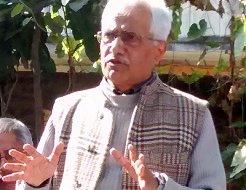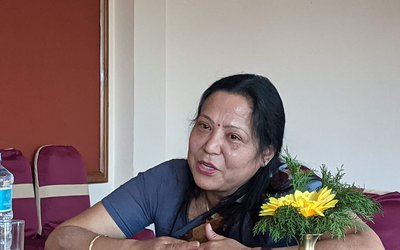
How possible is it to promulgate the new constitution by January 22, 2015?
Given the current political trend, I still hope that the new constitution will be promulgated by January 2015. Of course, more negotiations and discussions among the major political parties are necessary.
As there are so many differences among the leaders, how can you be hopeful?
The process of constitution writing very much depends on the skills of negotiation and flexibility on the part of parties involved in the disputes. Of course, we have differences on the form of government, judiciary, number of provinces and electoral process. However, ruling Nepali Congress and CPN-UML and opposition parties led by UCPN-Maoist are showing signs of flexibility. This gives me hope.
How do you look at the role CCPD chairman Dr. Baburam Bhattarai playing now?
Some of his recent decisions are controversial, including denying Nepali Congress and CPN-UML to register their stand. I am hopeful that he will register our proposal just as he registered a proposal earlier.
How do you see the possibility of consensus?
I have not lost the hope. Since we are in the negotiations, we will reach a consensus.
Since the mandate for the current CA, after its elections, is four years, why are you in a hurry to produce the constitution within a year?
You are right. The tenure of Constituent Assembly is four years and, for the CA, it is not legally binding to produce the constitution. However, our political leaders have made political commitments during the formation of the government a year ago. Morality is more important than legality. Thus, we need to promulgate the new constitution as per our commitment, to prove our sincerity to the people.
How are you so much hopeful?
After meeting with UCPN-Maoist leader Prachanda and other leaders, I am very much optimistic that opposition and ruling parties will come out with a consensus document before January 22.
As there is certain criticism on the Truth, Reconciliation and Disappearance Act over certain provisions, how do you look at this?
I don’t understand why there is such a criticism. As the act is drafted as per the international human rights standards and guidance given by the Supreme Court from time to time, this act is one of the best.
One of the criticisms of the act is that there are reportedly provisions for blanket amnesty for the perpetuators of severe rights violations?
There is no such provision in the act. What I can say is that this act is an act for truth and reconciliation. Thus, it cannot pursue the course of revenge against the individuals involved during the conflict. The act has made clear provisions to punish those who were involved in the incidents of gross human rights violations. No one can be given amnesty if he/she is found to have a role in a severe nature of rights violation, including rape and killing.
Have you taken note of the Court’s directives?
As I have mentioned that the act took note of the directives and guidance of Supreme Court, and concerns expressed by the International Community, right based organizations and Comprehensive Peace Agreement, the act has not breached any international conventions.
If so what stops you from putting the clause to send the persons involved in severe rights violations in the court?
If we punish all, where is the question of reconciliation? This act is not to just remind the wound of the people but to show the broader philosophy of reconciliation and peace. This is one of the major agenda of Comprehensive Peace Agreement. CPN-Maoist and the government signed the CPA with strong commitment to bring peace in the society.
Nepal is not the first case to see this kind of situation. Other countries of the world too have formed Commissions with legal mandate to book violator of human rights? What prevents to put such provisions in place?
Every country has its own system and process. One system does not fit all. So far as Nepal’s Peace Process is concerned it is home grown. The CPA was a part of CPA signed between CPN-Maoist and seven political parties. Despite this, there is enough provision to put the person involved in severe rights violation in trial. I would like to request all concerned to thoroughly read it.
Given the current controversy including the resignation of a member from the recommendation committee on certain provision of the law, how will the process of truth and reconciliation get the international legitimacy?
After the formation of the commission, we will need technical expertise like forensic experts and other rights experts to pursue the inquiry further. We cannot complete the process without support from the international community. Although Nepal's peace process was indigenous initially, there was also involvement of the international community in later stages. Even in the process of Truth and Reconciliation and Disappearance Commission, we needed the support of international community. I don’t think there arise questions of legitimacy of commission.
When will the Truth, Reconciliation and Disappearance Commission be constituted?
A high level committee has already been formed to recommend the names of persons for the Commission. The committee is in the process of recommendation. The committee, chaired by a former chief justice, has already started work and the court has also cleared the way for the recommendation. Following the recommendation of the names, we will constitute the commission.
- FOREIGN EXCHANGE: Largest Deposit
- Jul 22, 2024
- IMF: Approval Of SDR
- Jul 22, 2024
- NEPAL-KOREA RELATIONS: Fifty-Years Of Warm Relations
- May 31, 2024
- NEPAL-BRITAIN: Centenary Celebration
- May 31, 2024
- POLITCS: Forming New Alliances
- May 27, 2024
















